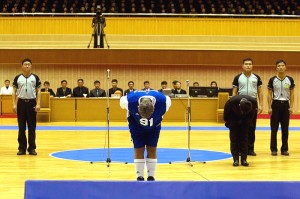Special to WorldTribune.com
By Donald Kirk, East-Asia-Intel.com
Why is it every time we get optimistic about North Korea “opening up” or making concessions or engaging in serious reconciliation, we get so disillusioned? Remember Kim Dae-Jung’s “Sunshine Policy?”

The North Koreans repaid him for his generosity by cranking up their nuclear program and exploding their first nuclear device in October 2006 during the presidency of Kim’s successor and political soul mate, Roh Moo-Hyun.
Inter-Korean summits at which Kim Jong-Il hosted first Kim Dae-Jung and then Roh did little or nothing to deter the North from nuclear adventurism.
Nor, for that matter, have gestures like performances in Pyongyang by the New York Symphony Orchestra or trips by students on carefully scripted tours with North Korean “students” done the least good when it comes to easing tensions.
Tourists, treated to the most spectacular mass show on Earth, the annual Arirang Games staged for weeks in May Day Stadium, grow accustomed to seeing the same sights, always in the custody of minders, but come away with no idea about what’s going on.
Against this background, it hardly seems realistic that Dennis Rodman and his “dream team” of former National Basketball Association players could have done much this week in Pyongyang other than to satisfy the ego of Kim Jong-Un during his birthday festivities.
That’s not to say there’s anything wrong with Rodman going there, pronouncing Kim Jong-Un as his bosom buddy and making a fool of himself.
If nothing else, his visit provided comic relief, a break after all the terrible publicity surrounding an unsubstantiated report of Kim watching another kind of exhibition — the grisly slaughter by trained attack dogs of one-time regent-mentor Jang Song-Thaek and other “enemies” of the regime.
As the favored son enters the third full year of his reign since the death of his father, the North Korean propaganda machine betrays concerns that he’s too young and inexperienced by avoiding mention of his exact age.
Did he turn 30 or 31 or 29 on Wednesday? All we know for sure is the birthday gave the young man a chance to enjoy himself after the ordeal of disposing of Jang.
But how happy could the birthday really have been for the roly-poly leader who felt the need to explain in his New Year’s address why he had to annihilate Jang, his uncle by marriage to Aunt Kyong-Hui?
Auntie’s failure to show up at a memorial for her older brother and their father, dynasty founder Kim Il-Sung, encouraged rumors that she was too shaken by her husband’s execution and/or too ill from liver disease and other ailments brought on by heavy drinking and dissolute ways.
Gordon G. Chang, long-time analyst of events in Asia and author of “Nuclear Showdown: North Korea Takes On The World,” sees the military as riding high as a result of the elimination of Jang and his gang.
The renaissance of the generals, whom Jang had sought to subordinate as vice chairman of the National Defense Commission and a key member of the politburo of the Workers’ Party, may backfire in revolt or at least unrest.
Kim “is in trouble because the North Korean military is insisting on extreme methods to get back power,” says Chang. Jang, he tells me, “was behind the October 2012 execution by mortar round of the assistant chief of staff of the Ministry of the People’s Armed Forces.”
As Chang puts it, “Revenge is now the dominant narrative in Pyongyang,” and ‘”the risk is that the Kim regime will tear itself apart.”
The problem is that getting rid of all those who worked for and with Jang, were loyal to him or at least aligned with him is no easy task.
“His allies were everywhere, from Pyongyang down to most municipalities,” says Chang. “Now, his comrades are being corralled — even from abroad — and they know that in all probability they will either be killed or sent with their families to the camps.”
In the end, their choice will be harsh but simple. “That means they will have to fight or flee,” says Chang, counting “at least nine executions since November, and there are bound to be many more.”
Probably, in the end, China will go on being kind to its North Korean protectorate, which counts on Beijing’s generosity for most of its fuel and half its food.
“The execution-by-dog story remains unconfirmed,” says Chang, but its publication “could be China’s way of pressuring Kim Jong-Un now in order to get advantage later.”
Rodman, playing his inimitable “basketball diplomacy,” professes to know nothing about any of this. The venture, however, was an embarrassment for Paddy Power PLC, the Irish betting firm, which withdrew as his trip’s sponsor but still promised to pay the bill.
Perhaps the firm should be taking bets on how long the Kim dynasty will survive — and how many have to die before its final demise.
Columnist Donald Kirk has visited Pyongyang five times and seen the Arirang Games at least three times. He’s at kirkdon@yahoo.com.

You must be logged in to post a comment Login